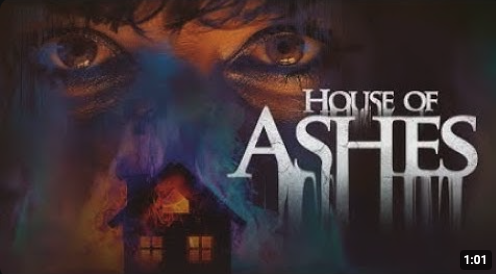Ashes to ashes: RIP women's reproductive rights
Hey, horror hottie.
I’m not long back from FrightFest Glasgow, and there’s a film I’ve been dying to discuss. Today, we’re talking about House of Ashes and the policing of women’s bodies.
HEADS UP: this issue contains discussions of pregnancy loss; if this is a painful subject for you, please sit this one out. I’ll catch you in the next issue x
Feel sufficiently warned? Good. Let’s get into it…
House of Ashes is a psychological haunted house horror directed and co-written by Izzy Lee. Mia (Fayna Sanchez) is the first woman to be placed under house arrest for a miscarriage, a tragedy which closely follows the mysterious and unsolved death of her husband, Adam (Mason Conrad).
As she prepares to hunker down alongside her new boyfriend, Marc (Vincent Stalba), Mia begins to experience a series of supernatural and psychological horrors that unearth dark truths which she’ll need to face before she can heal.

Let me start by saying that this newsletter is a review of the creative premise and the conversations around it rather than the film itself. Truth be told, I had high hopes for House of Ashes. While there are some solid performances (shout out Fayna), gorgeous lighting, and interesting ideas, I found it difficult to get past the mismatched performance styles given by the two leads.
The house arrest element primarily exists as a plot device to keep Mia trapped, and the issue is mainly left unexplored…in the film, at least. However, when chatting with FrightFest audiences, Lee revealed how integral the topic was to her creative process.
"We needed something that could be done in mostly one location. And so we came up with a story that is sort of universal to a lot of women, but also personal. The fact that there's a lot of loss of autonomy going on, and there's a deep feeling of being trapped," she said.
The real-world ramifications of this loss of autonomy helped Sanchez prepare for her role as Mia. "In January of 2024, when I was prepping to shoot this, there was a woman from my home state of Ohio who was charged with a felony for miscarriage in the United States. As we were filming this, that was happening."
She’s referring to Brittany Watts, a black woman who was charged with ‘abuse of a corpse’ after she miscarried alone in her bathroom following a total of 19 hours in hospital over two days with no induction or treatment, despite her 22-week-old foetus being declared nonviable by doctors several days prior.
According to the NHS, an estimated 1 in 8 ‘known’ pregnancies will miscarry, but many occur before the person even realises they’re pregnant. The source goes on to say that the majority of miscarriages are thought to be caused by abnormal chromosomes in the baby and are not the fault of the pregnant person. Furthermore, most miscarriages cannot be prevented.
Despite these medical facts, US authorities charged 210 women for behaviour relating to pregnancy, abortion, pregnancy loss or birth in the first year following the overturning of Roe v Wade. And the UK isn’t safe, either.
More than 30 expert medical groups recently issued a joint statement asking to reform a (still active!) Victorian-era law responsible for an “unprecedented” rise in women and girls being prosecuted following pregnancy loss and abortion. In El Salvador, a country with some of the world’s strictest reproductive laws, 180+ women have been jailed over the past two decades for similar ‘crimes.’
Labour MP Stella Creasy, told The Guardian: “We cannot ignore the fact that hundreds of women are still being investigated in often the most gruelling circumstances, having had a late-term miscarriage, or not even knowing they were pregnant at all. Instead of a counsellor, they get a police officer visiting them.”
Despite the mountain of evidence to the contrary, many people find the idea of a premise like House of Ashes to be a far-off dystopian nightmare.
“In other talkbacks and in other interviews, people have said, ‘Oh, [House of Ashes is set] in this post-apocalyptic future world,’ and it's not. It's not a future world. This is what is happening right now,” said Sanchez.
“When I first read the script, I wanted to tell that story because I just thought it was a great, strong premise of why she is under house arrest but also as a call to action, of like ‘this is happening now’. Women's health care, the autonomy of women, it can be resonated across all genders — it's not just something that happens to women. It’s such an important thing.”
Sanchez’s portrayal of unrelenting and all-consuming grief is one of this film’s strongest elements. She shows us a hollow woman, permanently teetering on the brink of shattering. Rather than compassion, she’s met with impatience, disgust, and morbid curiosity — a reaction that feels far too close to reality for comfort.
“I think life is far more terrifying than any film can ever be,” says Lee. “This was simply my way of holding a mirror to what things are rapidly becoming over on our side of the pond, and hopefully, it won't get much worse. We'll find out.”
Helpful resources
Get a mini review of FrightFest Glasgow here or enjoy a longer one by visiting the Horror Hangout podcast here.